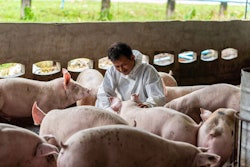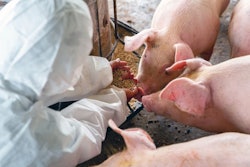
New ASF variants appears less deadly, which could allow it to spread among pigs more easily
Researchers say a new variant of African swine fever (ASF) virus appears to be circulating in China, prompting calls for increased vigilance against what appears to be a less deadly form of the disease.
According to a paper published October 28 by Chinese researchers, two additional variants of the ASF virus have been detected in two different provinces. Both of the variants resemble genotypes of the virus that were detected in Portugal in 1968, according to their report. That version of the virus has not been seen since Portugal eradicated ASF in the 1990s. However, it continued to circulate in Africa, according to the report.
The variants appear to be less deadly to pigs than the version of the virus sweeping the globe since the current outbreak began in 2018, according to the report from China. However, it may cause chronic disease and killed at least one pig in the study. Nearly all the pigs exposed to the new variants developed fever and joint swelling; skin and tissue died in about half of the pigs studied.
These new variants don’t appear to be directly related what is the most prevalent ASF virus, according to Paul Sundberg, executive director of the Swine Health Information Center. The current outbreak began when a version of the virus detected in 2007, called serotype II, made its way to China in 2018. The newly described variants are related to an older strain called serotype I, so it would be more correct to consider the emerging virus a “distant cousin” of the ASF the industry has grown familiar with, Sundberg said.
However, because serotype I causes less severe disease than serotype II, it may be more difficult to detect and, consequently, could spread more easily.
“International trade doesn’t care what serotype you have,” Sundberg said. “If you have ASF, you’re out of international trade, and the importance of this serotype I in China is that it’s an example of it being able to move out of Africa, its normal home. If it moves to somewhere else, there’s a possibility it can move other places.”
Because the ASF vaccines currently under development target the serotype II virus, it is likely he vaccines will be ineffective against the type I variants, Sundberg said.
Sundberg said producers should pay close attention to any international connections within their operation — not just international travelers, but any visitors or staff who may have contact with people traveling from countries affected by ASF. He also advised producers to be wary of imported pork products that could come onto their farm — even in a worker’s lunchbox — and to inquire about the origin of feed ingredients that are sourced internationally.
“We’ve seen that ASF is a potential contaminant in feed that can survive transport and cause infection,” Sundberg said. “In order to decrease that risk, ask your feed supplier where they get their feed components and see if they can source them from areas of the world that don’t get ASF.”
While the new variant is of concern because it is more difficult to detect, Sundberg said the industry and U.S. regulators are more prepared now than ever to combat the spread of ASF.


















